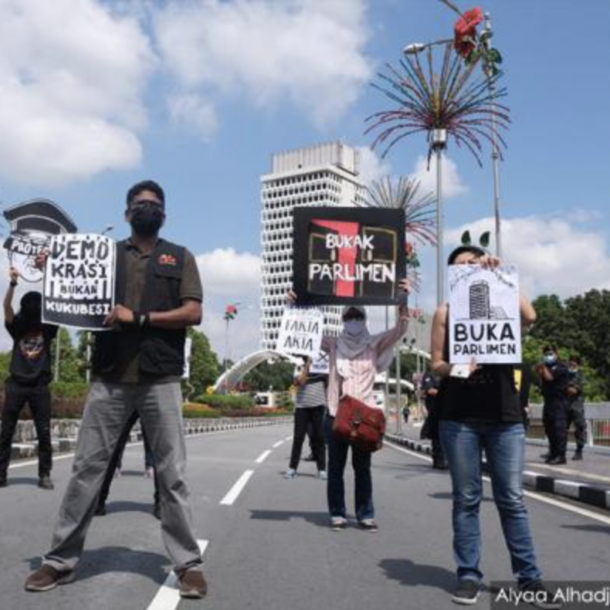
THE Emergency Ordinance continues to draw concerns from civil societies and think tanks despite the government’s assurance that it will not curb media freedom and government’s critics.
Minister of Communications and Multimedia Datuk Saifuddin Abdullah said the Ordinance was implemented to tackle fake news on Covid-19 and the Emergency Proclamation.
“This Emergency Ordinance foretells the continued attempts by this government to use any means possible to undermine our fundamental rights and freedom,” a group of civil society organisations, known as Freedom of Expression Cluster, said in a statement yesterday.
The group had also organised a protest in front of the Parliament, urging the government to reconvene the Dewan Rakyat session as soon as possible.
“Here, Emergency Ordinance No 2 on ‘fake news’ provides for heavy handed measures and circumvents due process for a fair trial. It denies protection for whistleblowers, or individuals to share their personal experiences,” the group said.
The Institute for Democracy and Economic Affairs (IDEAS) and the Centre for Independent Journalism (CIJ) have both expressed concerns over the decision made by the government to criminalise “fake news” under the Emergency Ordinance. IDEAS CEO Tricia Yeoh said the think tank is particularly concerned with the wide definition of “fake news”, which covers not only news related to Covid-19 but also on the proclamation of Emergency.
“The scale of the punishment of up to RM100,000 for those who create, publish or distribute fake news, or a jail term of up to three years, or both, is unnecessarily severe,” she wrote to a news platform.
Fake news under the law is defined as “features, visuals or audio recordings or in any other form capable of suggesting words and ideas”, including pure statistics, according to the media briefing last Friday.
The Ordinance also gives anyone found to have published “fake news” a 24-hour notice to take down said post or be liable to the penalties, as well as allowing the police (which is subject to court order) to take “necessary measures” to take down “fake news”, and permitting the police access to computerised data, including passwords and encryption codes, or risk a fine, jail term or both.
Yeoh added that the law gives the government sweeping powers to define any material as “fake news”.
“There is a clear absence of democratic mandate in the enforcement of this Ordinance, which makes it even worse than the repealed Anti-Fake News Act of 2018,” she said.
CIJ ED Wathshlah G Naidu said in a statement that what is equally alarming is the opportunistic nature of the current government, under the guise of an emergency, to reintroduce specific elements of the Anti-Fake News Act 2018, which was repealed by the previous Pakatan Harapan government in 2019.
“Fake news is not clearly defined in the law, opening the real possibilities of abuse through arbitrary arrests, investigations and punitive actions being taken against the alleged offender,” she said.
She added that the arbitrary use of the Ordinance will go against the fundamental norms of freedom of expression as enshrined in the nation’s Federal Constitution and international standards.
“As such, the government must immediately withdraw the Ordinance,” she said.
During the media briefing last Friday, Saifuddin said the Ordinance will expedite enforcement, investigation and prosecution processes.
“While the proceedings at the court remain as it is where the procedure is under the Code of Procedure Crime, Act 593 in court is maintained,” he said.
The Ordinance states that the law applies to any person involved in the distribution or dissemination of false news both within the country and abroad, regardless of nationality, given that the fake news in question affects Malaysia or a Malaysian citizen.
He added that the Ordinance is a short-term remedy to reduce the impact of the spread of untrue news about Covid-19 and the proclamation of emergency which was made effective on Jan 11, 2021, until Aug 1, 2021.
“The enactment of this Ordinance is imperative to ensure the people get authentic information from the right sources at once to maintain public and national order,” he said.
As such, court proceedings on such cases will remain the same, while the same Criminal Procedure Code will also be maintained.
Similar to the end-date of the emergency proclamation on Aug 1, 2021, the Ordinance will also only last for six more months.
As of March 12, a total of 287 investigation papers have been opened by the Royal Malaysia Police (PDRM) and Malaysian Communications and Multimedia Commission (MCMC) regarding fake news related to Covid-19.
Out of the total, a total of 113 of the papers are still under investigation, while 51 cases have been prosecuted. Thirty were found guilty, 20 are in the process of hearing and 12 have been given warning notices, according to statistics revealed by the MCMC.
Source: The Malaysian Reserve
